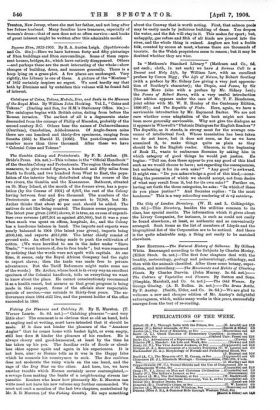In " Methuen's Standard Library" (Methuen and Co., 6d. net
each ; cloth, ls. net each) we have A Serious Call to a Devout and Holy Life, by William Law, with an excellent preface by Canon Bigg ; The Life of Nelson, by Robert Southey (with a preface by Mr. Sidney Lee giving a very just apprecia- tion of Southey's character); the Utopia, and Poems, by Sir Thomas More (also with a preface by Mr. Sidney Lee); the Poems of Robert Burns, with a very useful introduction (the edition appears under the care of Mr. T. F. Henderson, joint editor with Mr. W. E. Henley of the Centenary Edition, 1896-97) ; and The Republic of Plato. Here, again, we have a serviceable introduction by Mr. Raymond Barker. We are not sure whether some adaptation of the book might not have been more generally serviceable. Why not give the dialogue as it appears in Whewell's "Platonic Dialogues for English Readers"? The Republic, as it stands, is strong meat for the average con- sumer of intellectual food. Whose translation has been taken we do not know, but it does not seem, as far as we have examined it, to make things quite as plain as they should be to the English reader. Glaucon, in the beginning of Book II., wants to embarrass Socrates by asking him in which category of good things he would put justice. He begins : " Tell me, does there appear to you any good of this kind such as we would choose to have ; not regarding the consequences, but embracing it for its own sake ? " "Any good" is awkward. It might run : "Do you acknowledge a good of this kind,—some- thing the possession of which we should accept, not from desire of what may result from it, but for its own sake?" Further on, having set forth the three categories, he asks : " In which of these do you place justice ? " And Socrates replies : "In the most handsome." This is a very schoolboy rendering of & T KalAto-rep.














































 Previous page
Previous page